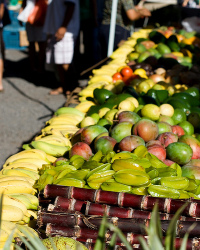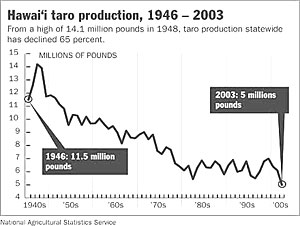Much of Maui County’s food is flown in or shipped in. Growing our own food would provide us with fresher and possibly less expensive produce. Home grown food is a security issue. And locally grown food makes Maui more sustainable.
 |
|
Fruit from backyards of Maui picked for the Food Bank
Suzanne Freitas and James Mylenek have started a volunteer group,
‘Waste Not, Want Not’, that gathers unharvested fruit wherever it can
be found and donates the fresh produce to Maui Food Bank.
Real homeland security
Michael Ableman, noted farmer, author, world traveler and lecturer,
shared his thoughts on food with an afternoon audience at Maui
Community College (MCC) last week, in a free event sponsored by the
Sustainable Living Institute of Maui (SLIM). Ableman, who manages the
120-acre Foxglove Farms on Salt Spring Island in British Columbia said
that Maui "may be the most food-insecure place on the planet."
Permaculture: coming to life on Maui
Local resident Claire Kellerman, of KLARITY.org, founded the Maui
Permaculture Network in 2006. She says that the "ethics" of
permaculture are: "1) Care of the earth. 2) Care of the people. 3)
Sharing and returning the surplus of abundance and beauty."
 |
|
Food or fuel?
The reality is that food and energy security cannot be separated. The
food and biofuel industries require many of the same resources-to grow
plants (and raise livestock), to harvest and process those plants (and
slaughter animals), to store and transport food and fuel. Hawai’i
already has limited resources for agriculture-will biofuel trump food
in the islands?
Sustainable farming vital for health of Isles
Great farmers are inspired to care for the land by sustaining the soils
for future generations and to care for community by creating good jobs
and delivering flavorful foods. Whether that farmer uses organic or
simply sustainable methods, great farmers care. When we support farmers
and ranchers who care, we all benefit in many ways, even if it starts
at simply great-tasting food.
Deal ensures farm use of Kipahulu site
A Kipahulu landowner has granted a conservation easement to the Maui
Coastal Land Trust to assure that a 75-acre property will remain in
agricultural use for perpetuity, trust President Tom
Blackburn-Rodriguez has announced. The property formerly was in sugar
cane and used for grazing, but the owner, a family trust, has begun
restoring the land as an organic agricultural operation. The farming
operation will include orchard trees as well as construction-grade
bamboo and varieties of trees that can be harvested as timber,
including koa, kou, kamani, mahogany and teak. The area has been named
"Ola Honua", for "life-giving earth".
